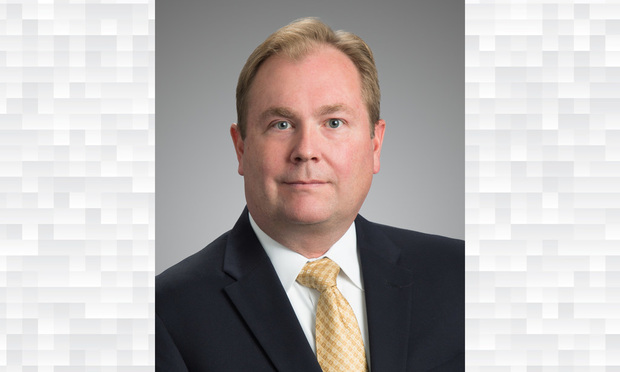Disability Leads Dallas Sidley Austin Partner to Create Support Group
When Sidley Austin partner Mike Hatcher was 23 years old, he was a U.S. Air Force fighter pilot with dreams of becoming the first astronaut to land…
May 31, 2018 at 04:20 PM
7 minute read
 Mike Hatcher of Sidley Austin.
Mike Hatcher of Sidley Austin.
When Sidley Austin partner Mike Hatcher was 23 years old, he was a U.S. Air Force fighter pilot with dreams of becoming the first astronaut to land on Mars until a disability changed both his life and his career.
If it weren't for a serious injury, Hatcher would have likely never become a lawyer. And now he's started an initiative at his firm that helps other attorneys like him.
Just seven months into his active duty training at Sheppard Air Force Base in Wichita Falls, Hatcher was riding home as a passenger on the back of a fellow pilot's motorcycle when they lost control on a bridge at 50 miles per hour.
While his friend escaped serious injury, Hatcher's face struck the bridge's retaining wall.
He was wearing a full-face helmet, but Hatcher nevertheless suffered 13 skull fractures, four facial fractures, numerous compound fractures throughout his body and a broken back. All of those injuries eventually healed except for one—the nerves in his right arm. They had been pulled away from his spinal cord, leaving that arm permanently paralyzed.
“The Air Force will not allow you to fly with one arm, so it pretty much ended my Air Force career,” said Hatcher, who medically retired from the service in 1994.
“I had a lot of time to think about what I wanted to do with my life. I looked inside [and] asked 'What makes me go, what drives me?' And what really drives me is competition. I couldn't contribute as much physically,” Hatcher said. “How I could compete mentally was as a lawyer. I could be a litigator.”
So Hatcher, who had earned an electrical engineering and physics degree while in the ROTC at the University of Miami, eventually attended Georgetown Law Center, where professors steered him toward intellectual property law.
“I didn't have any idea about doing patent work. But once I went to law school and they found out I was an electrical engineer, they said, 'We've got a spot for you.' And it was for patent litigation,” Hatcher said.
Hatcher clerked at Sidley's Washington, D.C., office during law school and took a job there as an associate after graduation in 2000. He moved to the firm's Dallas office in 2005, where he made partner. He now has a roster of big-name clients, including Apple Inc., Merck & Co. and Microsoft Corp., whom he regularly represents in patent litigation before U.S. district courts and the U.S. Patent Trial and Appeals Boards all over the country.
While Hatcher worked his way up the firm, he never drew attention to his disability by mentioning it to the firm or the juries he appears in front of. He just assumed people knew that he had one, he said.
“People ask me how I type and I can do it pretty darn fast with one hand,” Hatcher said. “From day-to-day when I'm in the office drafting a brief, it's not that limiting. But when I'm on my feet or in a courtroom, there are a lot of extra logistics. I can't just carry a box to court. And I have to think about where I'm going to put my pen on a podium if it doesn't have a ledge.”
In recent years, Hatcher noticed that his clients had become more sensitive to employing the disabled. And at least 25 of his clients sent Sidley a questionnaire inquiring whether the firm employed disabled attorneys, including Microsoft, which offers incentives and grants to companies that employ the disabled.
While it is estimated that fewer than 1 percent of lawyers employed by law firms are disabled, at least 20 percent of the U.S. population self-disclose as having a disability, according to U.S. Census Bureau statistics.
So Hatcher contacted Sally Olson, Sidley's chief diversity officer, last year about creating the Disability Diversity Alliance at the firm, an affinity group which encourages the firm's 2,000 lawyers to self-disclose their disability and provides support for family members who are disabled.
“It was something she was asking about, too,” Hatcher said, noting that while affinity groups for female and LGBT attorneys are common, few firms had support groups for disabled lawyers. “I've been practicing with a disability for a long time. And I really hadn't disclosed that to the firm.”
Olson said Sidley has had a general diversity initiative at the firm for more than 20 years and had accommodated individual attorney disabilities when asked for help, including a hearing-impaired litigator who needed a voice-to-print computer for courtroom work. But it hadn't been proactive about reaching out to employees who may have a disability but feared disclosing it.
“What really motivated us to look at this in a collective sense other than an individual one is when Mike spoke up,” Olson said. “We had helped individuals before but not created a network. And it took off like wildfire. I sent out an email asking if they would like to join a disability network and 100 of them signed up. It was a remarkable response.''
Olson said the Disability Diversity Alliance meets quarterly by video conference, advises the IT department how to make its website more accessible to the disabled, and educates the firm's managers on how to work with people who have disabilities and make accommodations for them.
And the group allows the firm to battle the stigma attached to workers who have disabilities, Olson said.
“I think we're seeing a change. There has been a stigma and I don't think it's been completely eradicated,” Olson said. “And we're encouraging people to self-disclose and that [the] stigma does not attach here. But typically people are afraid to self-disclose.''
Peter Blanck, a Syracuse University professor who has been commissioned by the American Bar Association to survey biases encountered by both LGBT and disabled lawyers in the legal profession, agreed that many lawyers are still afraid to disclose their disability.
“We have about 2,000 people who have responded and it keeps growing—a large number of them are from Texas. It would certainly suggest that clearly there are many more lawyers who did not consider themselves disabled, but may have issues like bipolar disorder, cancer, things like that that they might not want to disclose.”
“There is a very small number of lawyers who disclose for purposes of the Americans with Disabilities Act,” Blanck says. “And there are more lawyers who disclose as LGBT.”
Blanck notes that Sidley is only one of four major law firms in the United States that has an affinity group for employees and their family members who have disabilities. He said he hopes that his study will encourage more law firms like Sidley to recognize and publicly promote their disabled attorneys.
“My gut feeling is that we will find that there are many more lawyers who experience health- and disability-related conditions than report them. And the difficulty is how to disclose this information,” Blanck says. “If you look, a third of America either has a disability or has a relative that is disabled. We want to raise awareness to this issue.''
This content has been archived. It is available through our partners, LexisNexis® and Bloomberg Law.
To view this content, please continue to their sites.
Not a Lexis Subscriber?
Subscribe Now
Not a Bloomberg Law Subscriber?
Subscribe Now
NOT FOR REPRINT
© 2025 ALM Global, LLC, All Rights Reserved. Request academic re-use from www.copyright.com. All other uses, submit a request to [email protected]. For more information visit Asset & Logo Licensing.
You Might Like
View All
Troutman Pepper, Davis Polk Cases Put Partners' Feedback for Associates Under the Microscope
6 minute read
Best Practices: New Texas Law Mandates Audiovisual Recordings of Child Custody Interviews
12 minute read
Articulating the Nuances of Defendants' Right to Self-Representation in Criminal Trials
11 minute readTrending Stories
- 1When Words Matter: Mastering Interpretation in Complex Disputes
- 2People in the News—Jan. 28, 2025—Buchanan Ingersoll, Kleinbard
- 3Digital Assets and the ‘Physical Loss’ Dilemma: How the Fourth Circuit’s Ruling on Crypto Theft Stands at Odds With Modern Realities
- 4State's Expert Discovery Rules Need Revision
- 5O'Melveny, White & Case, Skadden Beef Up in Texas With Energy, Real Estate Lateral Partner Hires
Who Got The Work
J. Brugh Lower of Gibbons has entered an appearance for industrial equipment supplier Devco Corporation in a pending trademark infringement lawsuit. The suit, accusing the defendant of selling knock-off Graco products, was filed Dec. 18 in New Jersey District Court by Rivkin Radler on behalf of Graco Inc. and Graco Minnesota. The case, assigned to U.S. District Judge Zahid N. Quraishi, is 3:24-cv-11294, Graco Inc. et al v. Devco Corporation.
Who Got The Work
Rebecca Maller-Stein and Kent A. Yalowitz of Arnold & Porter Kaye Scholer have entered their appearances for Hanaco Venture Capital and its executives, Lior Prosor and David Frankel, in a pending securities lawsuit. The action, filed on Dec. 24 in New York Southern District Court by Zell, Aron & Co. on behalf of Goldeneye Advisors, accuses the defendants of negligently and fraudulently managing the plaintiff's $1 million investment. The case, assigned to U.S. District Judge Vernon S. Broderick, is 1:24-cv-09918, Goldeneye Advisors, LLC v. Hanaco Venture Capital, Ltd. et al.
Who Got The Work
Attorneys from A&O Shearman has stepped in as defense counsel for Toronto-Dominion Bank and other defendants in a pending securities class action. The suit, filed Dec. 11 in New York Southern District Court by Bleichmar Fonti & Auld, accuses the defendants of concealing the bank's 'pervasive' deficiencies in regards to its compliance with the Bank Secrecy Act and the quality of its anti-money laundering controls. The case, assigned to U.S. District Judge Arun Subramanian, is 1:24-cv-09445, Gonzalez v. The Toronto-Dominion Bank et al.
Who Got The Work
Crown Castle International, a Pennsylvania company providing shared communications infrastructure, has turned to Luke D. Wolf of Gordon Rees Scully Mansukhani to fend off a pending breach-of-contract lawsuit. The court action, filed Nov. 25 in Michigan Eastern District Court by Hooper Hathaway PC on behalf of The Town Residences LLC, accuses Crown Castle of failing to transfer approximately $30,000 in utility payments from T-Mobile in breach of a roof-top lease and assignment agreement. The case, assigned to U.S. District Judge Susan K. Declercq, is 2:24-cv-13131, The Town Residences LLC v. T-Mobile US, Inc. et al.
Who Got The Work
Wilfred P. Coronato and Daniel M. Schwartz of McCarter & English have stepped in as defense counsel to Electrolux Home Products Inc. in a pending product liability lawsuit. The court action, filed Nov. 26 in New York Eastern District Court by Poulos Lopiccolo PC and Nagel Rice LLP on behalf of David Stern, alleges that the defendant's refrigerators’ drawers and shelving repeatedly break and fall apart within months after purchase. The case, assigned to U.S. District Judge Joan M. Azrack, is 2:24-cv-08204, Stern v. Electrolux Home Products, Inc.
Featured Firms
Law Offices of Gary Martin Hays & Associates, P.C.
(470) 294-1674
Law Offices of Mark E. Salomone
(857) 444-6468
Smith & Hassler
(713) 739-1250







